Millennial Men Taking on Parental Leave, and More – Toronto News

Toronto’s finest business schools have been contributing to social, political, and scientific advances this week. We’ve laid out the highlights below.
How Testosterone May Be Influencing Men’s Purchasing Decisions – The Globe and Mail
Nature Communications recently published research from Western University Canada’s Ivey Business School that explored the relationship between testosterone levels and luxury brand purchases in men. The study finds that levels of the hormone, typically associated with sex drive and masculine features, could play a role in predicting shopping choices.
The study involved 243 men between the ages of 18 and 55, divided into two groups. The men in one group were given doses of testosterone, and those in the other group received a placebo. Those with higher levels of testosterone were more likely to purchase high-end brands than those with lower levels of the hormone. Researchers posited that this is due to an evolutionary drive to demonstrate high social status, and therefore a high mate value.
According to the study, testosterone, “elevates men’s desire to promote their social status through economic consumption.”
You can read more about the study here.
How Millennial Men Can Champion Workplace Equality – Forbes
Though, externally, it seems society has made remarkable strides toward gender equality, subconscious bias is more difficult to measure. Harvard’s Project Implicit study, however, attempts to gain data about implicit gender bias. Nearly 80 percent of participants were more comfortable associating men with the work and public spheres and women with the domestic spheres than vice versa.
According to the research, working mothers tend to be faced with skepticism surrounding their commitment and ability to do their jobs when they return from parental leave. However, millennial fathers, may have the chance to help alter this perspective. In her Forbes article, Mary Beth Ferrante sites the work of Erin Reid, Associate Professor at McMaster University’s DeGroote School of Business. Her work explains the concept of breadsharers, or, “husbands who value enabling each partner to pursue their work and family goals.”

Erin Reid, Associate Professor at McMaster University’s DeGroote School of Business, notes that the more millennial men take parental leave, the more normalized the practice becomes / Photo via gsb.stanford.edu
Milliennial fathers are more open to breadsharing, and could thus influence the way new mothers are seen in the workplace. Ferrante insists that it is essential for men to take their full parental leave in order to challenge implicit bias surrounding the roles of men and women in the workplace and at home.
You can read Ferrante’s full piece on millennial men influencing parental leave here.
What is the Most Democratic and Effective Way to Govern a City the Size and Economic Import of Toronto? – The Globe and Mail
Richard Florida, professor at the University of Toronto’s School of Cities and Rotman School of Management, and Alan Broadbent, Chair of Avana Capital and Maytree, recently co-authored an article for The Globe and Mail that explores Toronto’s future in the wake of Doug Ford’s announcement that he plans to drastically reduce the size of Toronto’s city council.
With different parties vying for a say in how Toronto ought be governed moving forward, the co-authors insisted that, “The province and the country as a whole can’t afford to have an economic entity of this size and economic importance kicked around like a proverbial political football.” Florida and Broadbent advocate for finding a system that would empower the city rather than dividing it.
The two say:
“We need to create a new governance system that enables Toronto to truly govern itself, act on its strengths and address its many problems and challenges. The future prosperity of our city, province and nation depends on it. It’s an issue that must be front and centre in this mayor’s race and beyond.”
You can read more about Toronto’s economic future here.
McMaster DeGroote Offers New Minor, and More – Toronto News

This week, Canadian business school have done their share to nurture innovative thinking in students and the broader community. We’ve laid out some of the high points below.
The Startup That Makes Globetrotting More Affordable– Communitech News
Rob Evans, graduate of Wilfrid Laurier University, is CEO and founder of Backpacker College, a startup that connects travelers with affordable places to stay (generally in university housing). Backpacker College allows universities to sell their unused beds during the summer, when students are on break. Through the app or website, travelers can access dorms at upwards of 115 universities, Laurier included. Speaking with Communitech News, Evans says:
“Now you don’t have to spend half an hour online judging how creepy your host might be, or what the best deal is on Google. We’ve already curated a set of great options that are affordable, we’ve ruled out the high-end and the low-end stuff and provided that mid-market that’s safe and affordable for families, sports teams, young travelers, retirees, as well as small groups and student accommodation.”
You can read more about the startup here.
New Minor In Innovation Gives Students A Head Start on Becoming Successful Entrepreneurs – DeGroote News
This fall, McMaster University’s DeGroote School of Business and Faculty of Engineering will partner with McMaster’s startup incubator, The Forge, to offer a minor in innovation to students interested in becoming entrepreneurs. The minor is meant to teach students to turn their own ideas into businesses, as well as how to think creatively within an organization.
On news of the new minor, Sue McCracken, Associate Dean at DeGroote School of Business, says, “The future of work is changing, and many of our students will be starting their own businesses within their own innovative ideas. We need to give these students the entrepreneurial skills and knowledge to take the right steps and risks to develop their ideas and build successful businesses.”
The DeGroote minor is open to all McMaster students. Beginning in September, students will be able to take The World of Entrepreneurship, which consists of case studies and prominent guest lecturers, and Lean Startup, which will teach skills like establishing a business model and testing business ideas with customers and stakeholders. Additional courses such as Founders Startup and From Founder to CEO will become available over the next three years.
You can find out more about the new DeGroote minor here.
Lessons in Leadership from MBA Leadership Day – News@Ivey
In late July, the 2018 MBA Leadership Day was held at Western University Canada’s Ivey Business School. The day kicked off with a “Learning to Become Better Leaders” panel, featuring three Ivey alumni. The day concluded with a speech from Deepak Chopra, former President and CEO of Canada Post.
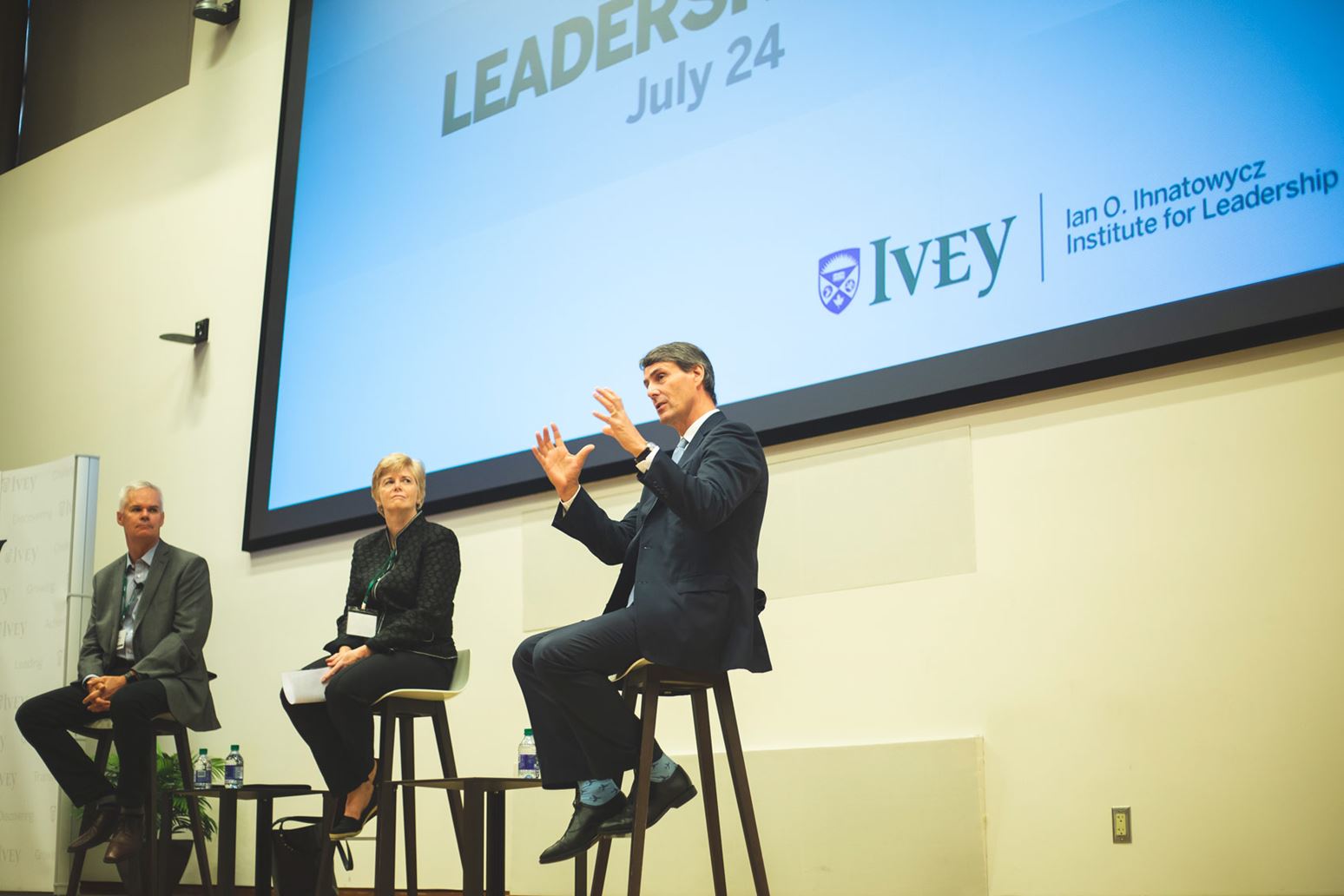
(Left to right) Pat Horgan, Barbara Stymiest, and Jon Hantho, attending this year’s MBA Leadership Day at the Ivey Business School / Photo via ivey.uwo.ca
The panelists offered important insights for the budding MBA’s. The panelists talked about the value of building a solid team, taking breaks, being humble, creating a strategy, and maintaining a big-picture perspective.
You can learn more about the key advice given to those in attendance at the MBA Leadership Day here.
Future U.S. Relations, Fullbright Scholars, and More – Toronto News
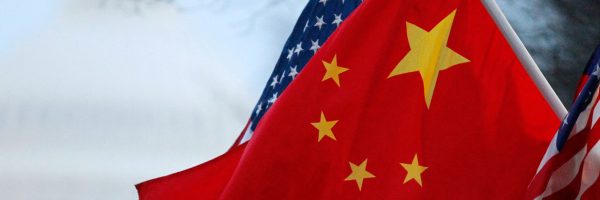
As summer roles on through North America, lets take a look at what has been going on at Toronto’s business schools.
Lessons in Chinese History As America Shuts Off From the World – The Conversation
Walid Hejazi, International Business professor at University of Toronto’s Rotman School of Management, recently wrote about how the possible trajectory of the U.S. under President Trump would be similar to that of China’s downfall in the 1800s.
Hejazi warned that Trump’s isolationist actions, such as his rejection of the Trans Pacific Partnership and imposed tariffs on steel and aluminum imports, could close the U.S. off to the rest of the world.
“There is a clear contradiction between ‘make America great again’ and closing off from the world,” Hejazi wrote in The Conversation. “If the U.S. closes itself to the world, its future as a world leader in every way is at significant risk.”
You can read the entire Hejazi’s piece here.
CIBC Mellon Appoints Karen Rowe Chief Financial Officer – CIBC Mellon
Investment services company CIBC Mellon has announced that Karen Rowe will fill in as the brand new CFO. Rowe is also an acting member of the Advisory Council for the School of Accounting and Finance at Ryerson University’s Ted Rogers School of Management. In a recently released statement, Rowe says:
“CIBC Mellon is well-regarded by institutional investors as Canada’s leader in asset servicing, and I am proud to join the company and support its financial management. I am looking forward to contributing to CIBC Mellon’s strong operational execution, service excellence and continuous improvement.”
You can read more about Rowe’s role at CIBC Mellon here.
Fulbright Scholar Award Powers Adam Fremeth’s Energy Policy Research – News@Ivey
Ivey School of Business Associate Professor Adam Fremeth has been officially named as the newest Fullbright Canada Scholar Award winner—the first school recipient to earn the award since 1990. He will be joining Indiana University in the U.S. from January to May of next year, “where he’ll research how electric utility firms are interacting with state regulatory bodies as well as the impact of energy policies, particularly in the area of renewable energy,” according to an Ivey press release.
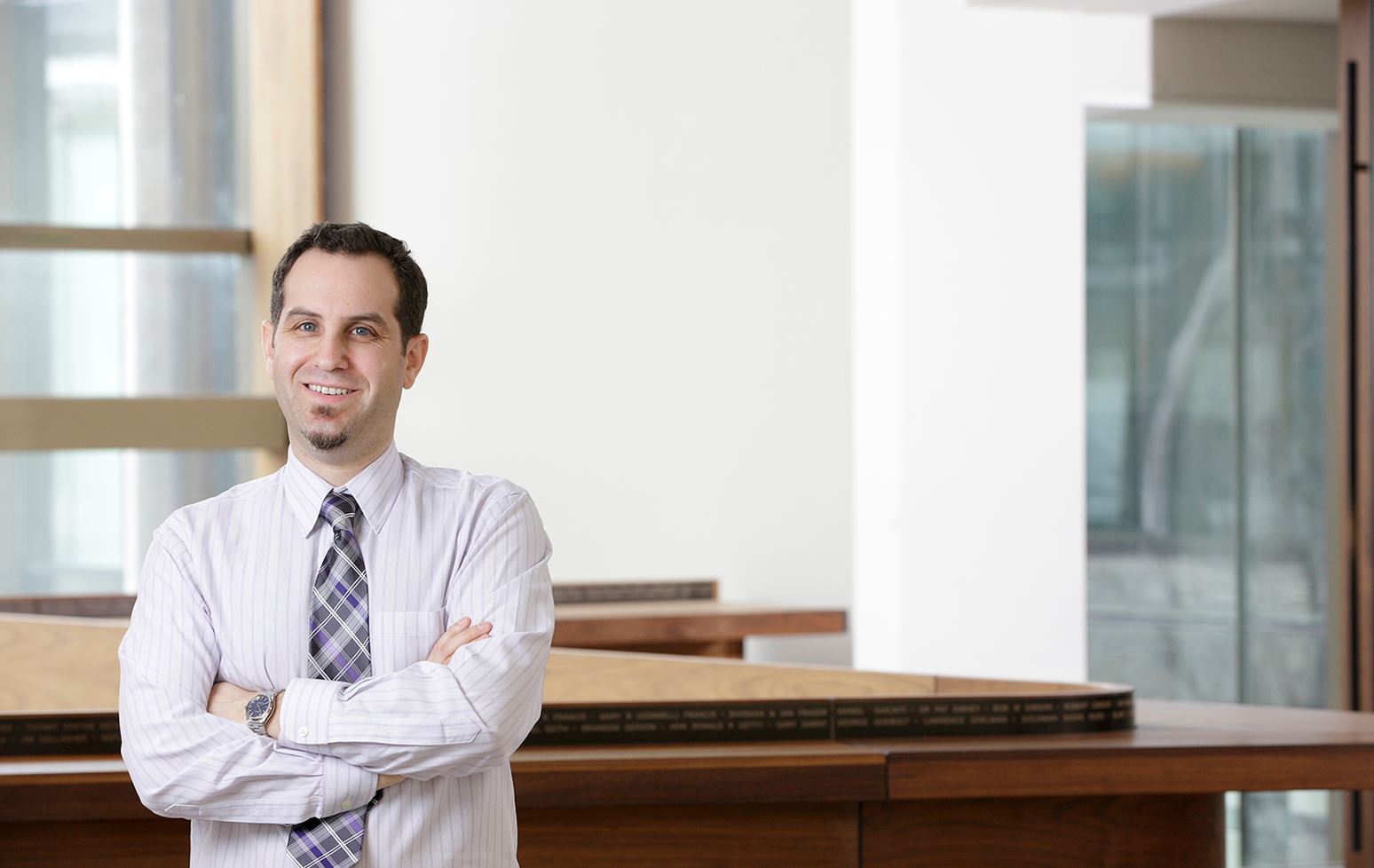
Ivey Associate Professor Adam Fremeth, the newest Fullbright Canada Scholar Award winner / Photo via ivey.uwo.ca
“A lot of my work deals with energy policy issues in the U.S. and being in Indiana and the Midwest more broadly allows me to get exposed to a lot more of those issues and to interact with, not just the academic community, but also the business and public policy communities they serve,” Fremeth said in the release. “I hope to bolster my research agenda, get some firsthand interactions in the areas I’m studying, as well as perhaps broaden my work with exposure to what people outside of Ivey and Canada are doing.”
You can read more about Fremeth’s work and the award here.
Degroote Prof Receives Award, and More – Toronto News

Though most schools experience a summer lull, professors and alumni from Toronto’s finest business schools are continuing to give back to their communities and lead the way to positive change. Below, we’ve laid out some of the most exciting news stories from Toronto metro business schools this week.
The Difference Maker: Mahmut Parlar Honoured for 30 Years of Exceptional Research, Teaching, and Service – McMaster News
Mahmut Parlar, Business Research professor at McMaster University’s DeGroote School of Business has been tapped to receive the Canadian Operational Research Society’s Award of Merit. Mahmut is passionate about his job, and goes out of his was to make statistics fun. He even uses a beach ball exercise to start his grad classes. After 30 years of teaching and research, Parlar still feels passionate about his work.
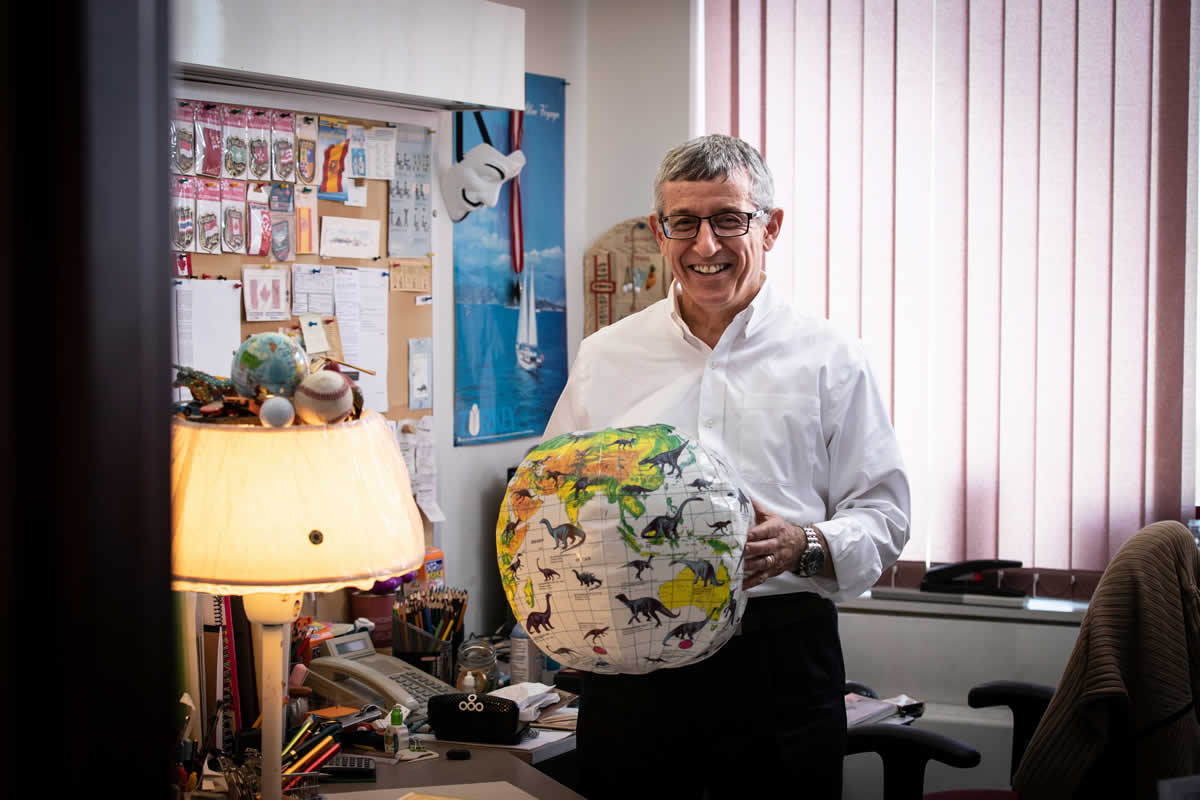
Mahmut Parlar / Photo via degroote.mcmaster.ca
“They pay me to do what I love; I’m a lucky person,’’ Parlar said in an interview. The professor even commented that he continues to feel grateful and excited each time he sees that someone has cited his work. This is impressive seeing as his work has been cited upwards of 6,000 times.
“You always hear people say stats is boring, it’s dull. People take a stats course because it’s a requirement, not because they find it interesting or valuable … why not make it fun?” -Mahmut Parlar
You can read more about Parlar’s work and award here.
Cryptoeconomics and the Future of the Web – News@Ivey
Ryan Zurrer, who graduated from Western University Canada’s Ivey Business School in 2006, recently gave a talk on cryptoeconomics. The Ivey alum, who is now Principal and Venture Partner at Polychain Capital, talked about the sweeping importance of cryptoeconomics and blockchain 2.0, which started in Toronto. According to Zurrer, cryptoeconomics is “the study of how we use digital incentivization to drive specific resources and behaviours among self-interested agents on decentralized networks, thereby inherently delivering security and accelerating network effects.”
Cryptoeconomics contains elements of group psychology, cryptography, network security, finance, behavioral economics, computer science, law, and game theory.
“All we’re doing here is trying to change the fabric of commerce and law, and the way society functions and politics and the very nature of the organization. We don’t have to take ourselves so seriously about it. Have fun, enjoy this process even if you’re not technical, it doesn’t mean you can’t get involved in cryptoeconomic systems.”-Ryan Zurrer
You can read more about Zurrer’s talk here.
Toronto’s Deadly Car Crisis – Medium
Richard Florida, Director of Cities at the Martin Prosperity Institute in the University of Toronto’s Rotman School of Management, recently wrote a Medium article in which he detailed the dire issues with driving in Toronto. Florida pointed out that Toronto’s rate of pedestrian deaths exceeds that of Chicago, San Francisco, Boston, D.C., Seattle, Pittsburgh, Cleveland, Portland, and Buffalo.
Though Florida acknowledged that a car-centered economy was reasonable after WWII, he believed the model no longer makes sense. He cited cities like New York and London, which have grown beyond their “geographic threshold,” due to their reliance on alternate modes of transportation.
“Torontonians like to sound off on Americans’ inability to deal with guns and gun deaths. But Toronto’ s inability to deal with the car creates its own killing fields,” Florida writes.
You can read more about Toronto’s car crisis here.
Schulich Professor Honored, and More – Toronto News

This week has seen strides for Toronto’s business schools, so lets take a look at some of the highlights.
Serving the Public Good – Corporate Knights
Ed Waitzer, professor at the Osgoode Hall Law School and York University’s Schulich School of Business in Toronto, is the newest recipient if the Corporate Knights Award of Distinction.
In addition to teaching corporate law at York University’s Schulich School of Business, Waitzer is on the advisory board of the Pontificia Universidad Católica de Chile’s corporate governance centre, and frequent lecturer at various universities. At 64, Waitzer remains active and continues to challenge his students and peers to question “compliance mentality,” and decipher what it means to do the right thing in any given situation.
“Ed has spent much of his life advancing the legal foundations for corporations and pension funds to better serve the public good. He’s brought a high level of credibility to interpreting a complex body of law in ways that expand the concept of fiduciary responsibility and allow business leaders to use their power to better serve the interests of a wide range of stakeholders. He makes it less possible for a corporate or pension board to shut down, say, discussions about blackballing child labour or coal because, ‘We have a fiduciary duty to our shareholders.’” -Toby Heaps, Corporate Knights CEO and Publisher.
Learn more about Waitzer’s life and career here.
Ivey MBA Association Welcomes New President – News@Ivey
Western University Canada’s Ivey Business School’s MBA association has elected Marika Marty as its president. Marty was elected by the MBA class of 2019 and will be the first president the association has seen in over 15 years. As president, Marty will represent the student body and facility unity in her class.
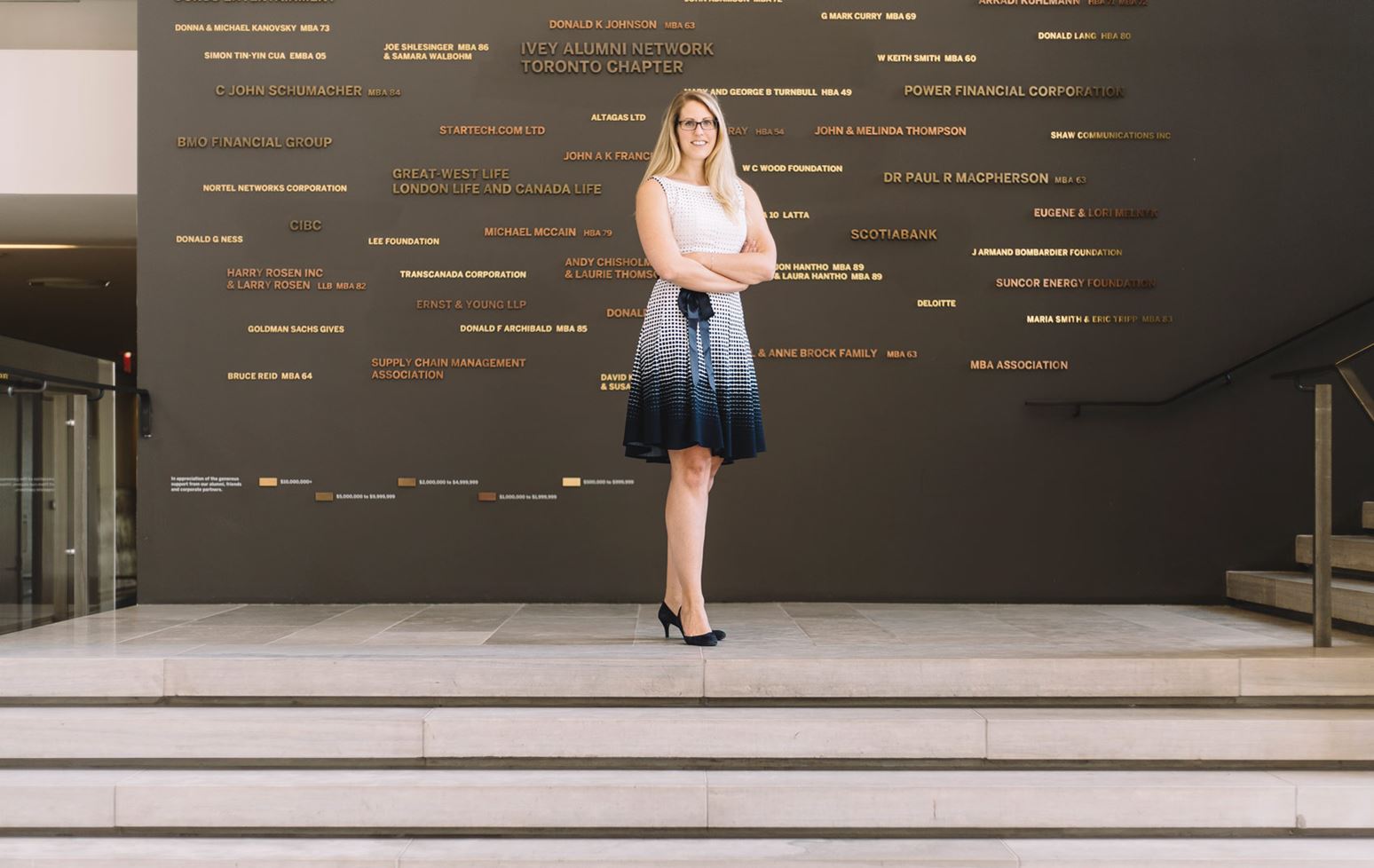
Marika Marty, ’19 MBA / Photo via ivey.uwo.ca
The new MBAA said that initially she put off even applying for her MBA for years, thinking that she would have to choose between a career and a family. However, she soon realized this thinking was flawed and chose to challenge herself. “As women, sometimes we sell ourselves short. Being able to embrace opportunity is the real challenge,” Marty said.
Read more about Ivey MBAA’s new president here.
The Debate In Canada Over Paying Plasma Donors – Policy Options Politics
In a recent article in Policy Options Politics, the need for plasma and the choices facing policy-makers has come to a face.
The paper—co-written by Nicola Lacetera, associate professor at the University of Toronto’s Rotman School of Management, and Mario Macis, associate professor at Johns Hopkins University’s Carey Business School—notes that over 80 percent of plasma used to treat patients in Canada is brought in from the U.S. Both the US and Germany can provide a significant amount of plasma, as their laws allow for the creation of private collection establishments as well as compensating donors for the time commitment and discomfort that accompanies donation, but the majority of Canadian provinces prohibit the payment of donors and establishing for-profit collection centers.
In the exploration of the issue, Lacetera and Macis cite the problems with paying plasma donors as well as the benefits (greater incentive to donate, thus less reliance on foreign imports). For example, paying donors could lead to an increase in tainted donations from people who are not healthy, and are just trying to earn money quickly.
Read more about options for increasing domestic plasma donation in Canada here.
Ivey Professor Honored, and More – Toronto News

Professors from some of the Toronto metro’s finest business schools have littered (definitely not literally, in the case of environmental education pioneer Tima Bansal) news headlines this week. Let’s take a look at some of the highlights.
Ivey Professor Tima Bansal Honored for Innovative Teaching – News@Ivey
Tima Bansal, professor at Western University Canada’s Ivey Business School, has been tapped to receive an Ideas Worth Teaching award. During her time as Director of both the Network for Business Sustainability and the Centre for Building Sustainable Value, Dr. Bansal has integrated sustainability into every part of Ivey’s MBA experience.
Where many programs have sustainability electives, Dr. Bansal has elected to co-teach the core MBA courses, so that sustainability practices are not seen as separate from the fundamentals of business education. Bansal was one of 20 winners who will be honored at Working Towards Shared Prosperity: An Academic-Executive Dialogue in Ann Arbor, Michigan this October.
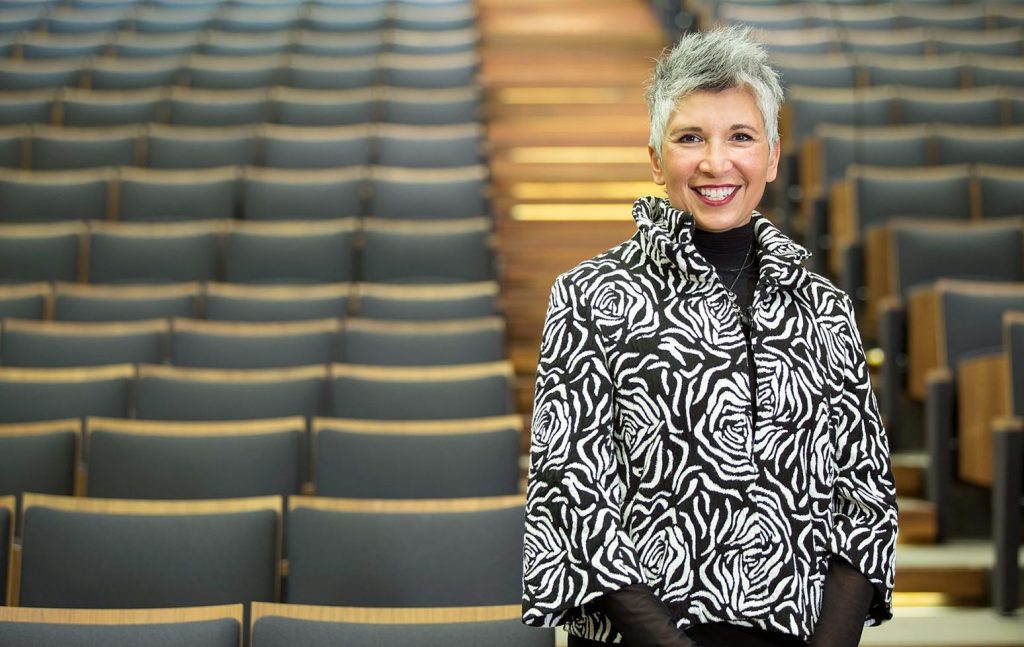
Professor Bansal / Photo via ivey.uwo.ca
Read more about Dr. Bansal’s teaching methods here.
Behavioral Economics Expert at University of Toronto’s Rotman School Receives A Canada Research Chair – EurekAlert!
The Canadian government has announced that Dilip Soman, professor of marketing at University of Toronto’s Rotman School of Management, will serve as the Canada Research Chair in Behavioral Science and Economics. Soman is the Director of Behavioral Economics in Action at Rotman (BEAR), wherein he supervises the use of research findings to help tackle social problems. A recent press release detailed Soman’s work, saying:
“Prof. Soman is a world leading researcher in the area of behavioural economics and its applications to consumer wellbeing, marketing and policy. His work combines insights from psychology and economics to better understand how individuals make decisions.”
As a Canada Research Chair, Soman will have the opportunity to aid in and supervise important research and help train future leaders who show promise.
You can read more about professor Soman here.
How Our Collective Narcissism Explains Everything from Trump and Brexit to China’s Rising Dominance – The Globe and Mail
The Globe and Mail recently released an article that featured research from Russell Belk, a marketing professor at York University’s Schulich School of Business. Belk’s paper, which was published in the Markets, Globalization & Development Review, focused on the theory of “collective narcissism” as it pertains to current world events.
According to Dr. Belk’s work, the nationalistic collective narcissism that led to the Brexit vote in the UK, President Trump’s 2016 election in the United States, and China’s rising global presence is rooted in the belief that others are impeding a nation’s potential for greatness.
“Brexit and the election of Trump both relied on a particular type of nationalistic appeal to collective narcissism—an exaggerated emotional belief that the nation’s greatness is being undermined by other nations and other people. This tendency is catered to by appeals to make the nation great again by shutting borders and embracing isolationism while scapegoating refugees and immigrants. The rise of jingoistic leaders like Trump, Putin, and Erdogan can be explained by such appeals.”
Dr. Belk also explains that China’s move toward globalism is also tied to collective narcissism, as the country is expanding its reach while “rejecting multiculturalism.”
Read more about Dr. Belk’s paper here.
